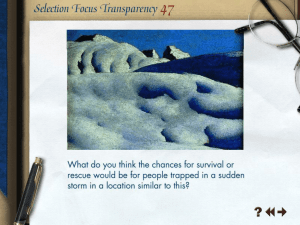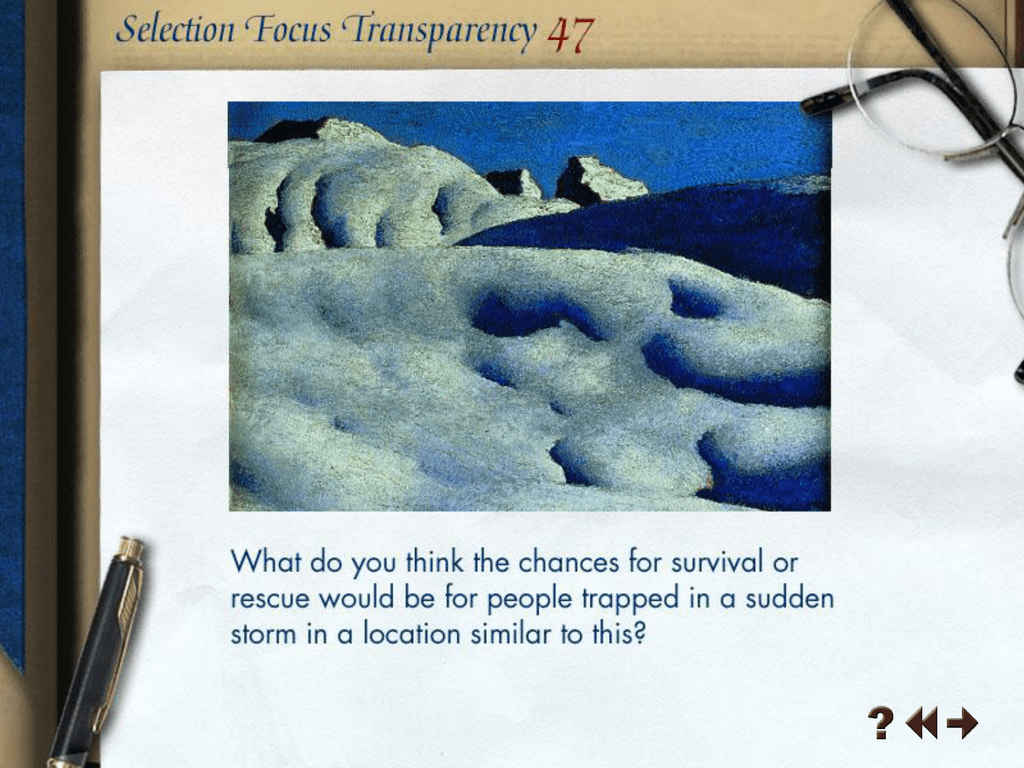The Outcasts Of Poker Flat Study Questions
Learn English Through Story - The Outcasts of Poker Flat by Bret Harte By: English Story channel Story title: The Outcasts of Poker Flat Author: Bret Harte T. Why are the outcasts trapped in the Sierras: Snowstorms prevent their leaving: Where is Mr. Oakhurst’s body discovered at the end of the story: Under the snow under the tallest pine tree: Why is Mr. Oakhurst banished from Poker Flat: He has won a great deal of money: How does Mr. Oakhurst respond to Tom Simson’s innocence: Feels protective. Honors English 9 “The Outcasts of Poker Flat” by Bret Harte Directions: Write ten multiple choice questions and a summary that demonstrate that you have read all of “ The Outcasts of Poker Flat.” Write the page number where you found the question/answer. For this assignment, you only need three choices per question. Questions Answers 1.
'The Outcasts of Poker Flat' (1869) is a short story written by author of the American West Bret Harte. An example of naturalism and local color of California during the first half of the nineteenth century, 'The Outcasts of Poker Flat' was first published in January 1869 in the magazine Overland Monthly. It was one of two short stories which brought the author national attention.

Plot summary[edit]

The story takes place in a Californian community known as Poker Flat, near the town of La Porte. Poker Flat is, in the opinions of many, on a downward slope. The town has lost thousands of dollars, and has experienced a moral decline. In an effort to save what is left of the town and reestablish it as a 'virtuous' place, a secret society is created to decide whom to exile and whom to kill. On November 23rd of 1850, four 'immoral' individuals are exiled from Poker Flat and warned not to return on pain of death. The first of them is a professional poker player, John Oakhurst. He is among those sent away because of his great success in winning from those on the secret committee. On his way out of town, he is joined by two women, the Duchess and Mother Shipton, and Uncle Billy, the town drunk and a suspected robber. These four set out for the Sandy Bar mining camp, a day's journey away over a mountain range. At noon, the group stops for a rest over Oakhurst's protests.
While on their rest, the group is met by a pair of runaway lovers on their way to Poker Flat to get married. Piney Woods is a fifteen-year-old girl. Her lover, Tom Simson, known also as 'the Innocent', met Oakhurst before and has great admiration for him, as Oakhurst won a great deal of money from Simson. Oakhurst had returned the money and urged Simson never to gamble again, as he was a terrible player. Nonetheless, Simson is thrilled to have come upon Oakhurst on this day, and decides that he and Piney will stay with the group for a while. They do not know that the group is one of exiles, and Simson assumes that the Duchess is Oakhurst's wife, to the amusement of Uncle Billy.
A decision is made for everyone to stay the night together, and they take shelter in a half-built cabin Simson has discovered. In the middle of the night, Oakhurst wakes up and sees a heavy snowstorm raging. Looking about, he realizes that Uncle Billy has fled with the group's horses and mules. They are all now forced to wait out the storm with provisions that will likely only last for another 10 days. After a week in the cabin, Mother Shipton dies, having secretly and altruistically starved herself in order to give her rations to Piney. Oakhurst fashions some snowshoes for Simson to use in traveling to Poker Flat for help, telling the others he will accompany the young man part of the way. The 'law of Poker Flat' finally arrives at the cabin, only to find the Duchess and Piney frozen to death and embracing in a peaceful repose. They look so peaceful and innocent that the onlookers cannot tell which of them had been exiled for her immoral behavior.
Oakhurst commits suicide under a tree by shooting himself through the heart with his derringer. A playing card, the two of clubs, is found pinned to the trunk with a note written on it:
The Outcasts Of Poker Flat Story


BENEATH THIS TREELIES THE BODY OF JOHN OAKHURST, WHO STRUCK A STREAK OF BAD LUCK ON THE 23rd OF NOVEMBER, 1850, AND HANDED IN HIS CHECKS ON THE 7TH DECEMBER, 1850.
Characters[edit]
- John Oakhurst
One of the story's heroes, Oakhurst is occasionally frank but kind in motivation. He is chivalrous, insisting upon switching his good riding horse Five Spot for the mule of the Duchess and refusing to use vulgar language. He further shows his good nature by returning the $40 he had won from Tom Simson in a card game and saying, 'Tommy, you're a good little man, but you can't gamble worth a cent. Don't try it over again.' Oakhurst is not a drinker. He is cool tempered, even keeled and has a calm manner about him. He believes in luck and fate. His suicide spurs the question whether he was simply giving in to his bad luck or rather, decided he was no longer going to live by luck and took his life.
- The Duchess, a young woman.
- Mother Shipton, another woman.
- Uncle Billy, a 'suspected sluice-robber and confirmed drunkard'.
- Tom Simson, a naïve young man who has run away from the Sandy Bar mining camp with Piney Woods and who intends to marry her at Poker Flat.
- Piney Woods, a 'a stout, comely damsel of fifteen' who is engaged to Simson.
Film, TV or theatrical adaptations[edit]
Harte's story has been brought to film at least five times, including in 1919 with Harry Carey, in 1937 with Preston Foster, and in 1952 with Dale Robertson. The spaghetti westernFour of the Apocalypse is based on this story and another of Harte's stories, 'The Luck of Roaring Camp'.
Outcasts Poker Flat Summary

Operas based on The Outcasts of Poker Flats include those by Samuel Adler,[1]Jaromir Weinberger,[2] Stanworth Beckler,[3] and Andrew Earle Simpson.[4]
Outcast Of Poker Flats Movie
References[edit]
- ^'Archived copy'. Archived from the original on 2006-05-18. Retrieved 2006-08-09.CS1 maint: archived copy as title (link)
- ^'Jaromir Weinberger – Outcasts of Poker Flat – Opera'. boosey.com.
- ^'Archived copy'. Archived from the original on 2006-07-18. Retrieved 2006-08-09.CS1 maint: archived copy as title (link)
- ^Andrew Earle Simpson. 'Coming to The Capital Fringe Festival: 'The Outcasts of Poker Flat''. DCMetroTheaterArts.
External links[edit]
| Wikisource has original text related to this article: |
- The Outcasts of Poker Flat public domain audiobook at LibriVox
- The Outcasts of Poker Flat – Annotated text + analyses aligned to Common Core Standards
Bret Harte’s short story “The Outcasts of Poker Flat” is one of the most anthologized examples of the subgenre of American literature known as Regionalism. The identifying characteristics of Regionalism include an emphasis on replicating dialect and speech patterns, highlighting the customs and traditions of a culture, and emphasizing the influence of geographical factors in the daily lives of the those living within the region being explored. The irrefutable master of Regionalism in American prose is, of course, Mark Twain, but “The Outcasts of Poker Flat” is as much an elemental entry into any serious overview of the subgenre as anything Twain ever wrote.
Like most writers who served to create the mythos of the frontier and the Wild West, Bret Harte was born back east. In fact, Harte hailed from about as far east as it is possible get in America: Albany, New York. A few years after gold was struck in California, Harte packed up and headed west where he would spend many years in aimless search of a calling while finding temporary employment in jobs ranging from teacher to file clerk. The one factor unifying all his many varied working experiences was the surrounding setting: mining camps and boomtowns. As a result, whether earning money from tutoring or prospecting for gold himself, what Harte took away from each job was greater insight into the what life was like for those also trying to find their fortune in such a rugged and undeveloped region of the world.
Life spend in the full-time company of miners eventually resulted in a wealth of material robust enough to fill story after story for Harte, but time has decided that “The Outcasts of Poker Flat” is his unqualified greatest creation inspired by his own real-life experiences. The story was initially published in Overland Monthly magazine in 1869 and today it is very difficult to find an American literature textbook which does include lessons on the story. The story was first adapted for film in 1919 and four more film adaptations followed. Somewhat surprising, perhaps, is the lack of a new film version of the story in more than half a century. Even more surprising may be that “The Outcasts of Poker Flat” has found success in a place far removed from that rugged, hardscrabble terrain in which it is set: opera houses across the world. The story was transformed into an opera in 1959.
It is in its original form as one of the literary foundations that helped to mythologize the American frontier that “The Outcasts of Poker Flat” still finds its widest audience, however, as a new crop of schoolchildren are introduced to the colorful inhabitants of Poker Flat with each passing year.